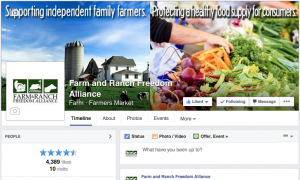Action Alert: Protect Small Farmers and Food Producers from FSMA Regulations
Updated November 5, 2014.
We fought hard for the Tester-Hagan amendment to exempt small-scale, direct-marketing farms and artisan food producers from the most burdensome aspects of the Food Safety Modernization Act (FSMA). This exemption is essential to the continued vitality of the local foods movement.
Now the FDA is proposing rules that would make it very easy for the agency to force even small-scale farmers to comply with the onerous FSMA regulations, and all but impossible for these vulnerable farmers to protect themselves.
Consequences of the Proposed Rules
Under the proposed rules, if the FDA decides to revoke the Tester-Hagan exemption and force a small-scale, direct-marketing farmer or artisan food producer to comply with the new federal requirements:

- The farmer or producer gets only 10 days to submit a written appeal;
- FDA does not have to grant the farmer or producer a hearing;
- FDA is not held to any specific standard for what evidence must be shown to justify the revocation; and
- The farmer must comply with all FSMA regulations within 60 days, and food producers must comply within 120 days; under either deadline, it will be impossible for most small-scale businesses to survive and stay in business.
In practical terms, under the agency’s proposed rules, the FDA will be able to target small farms and food producers one-by-one and put them out of business, with little to no recourse for the farmers.
This is the second round of proposed rules under the FSMA, and we objected to these same problems in the first round. While the agency has added a provision that allows the farmer or food producer to petition to re-instate the Tester-Hagan exemption, that could only occur after the farmer has already complied — which means that it would be too little, too late in most cases.
Please sign on to our letter to tell FDA to implement the Tester-Hagan exemption fairly! More details are in Action Item #1, below. We need even more people to speak up this time!
You can help even more by calling your Congressmen, spreading the word, and submitting your own comments directly to the FDA — see the action items below.
Additional Issues
The agency has added a brand new provision that would require businesses who purchase ingredients from exempt farms to get various “assurances” from the farm. This ambiguous provision could create a significant deterrent for small farms who seek to provide fresh ingredients to local businesses, hurting both the farms and the businesses and ultimately reducing consumers’ food options.
There are also multiple problems with the substantive provisions of the proposed regulations, which would apply to many wonderful mid-size farmers and food businesses who aren’t exempt under the Tester-Hagan exemption. Stay tuned for another action alert later this month on how you can speak up on those issues!
Action Item #1: Sign the Letter by December 12
 Please sign on to our letter to tell FDA to implement the Tester-Hagan exemption fairly!
Please sign on to our letter to tell FDA to implement the Tester-Hagan exemption fairly!
SIGN ON HERE*: http://bit.ly/sign-the-tester-hagan-letter
*The sign-on is through a Google Docs form — if you prefer to sign on via email, contact Judith@FarmAndRanchFreedom.org
The FDA is accepting public comments until Monday, December 15; we will be collecting sign-on’s to the letter until Friday, December 12, so that we can compile all of them and submit them in time.
Read the full text of the letter at: https://farmandranchfreedom.org/fsma-tester-hagan-2014-sign-on-letter
Whether you are an individual consumer, a farmer, farmers market, food business, or nonprofit, please join us in this fight to protect small farms and food producers!
Action Item #2: Contact Your Congressmen
 Congress has the power to rein in the FDA’s overreach — but Congress will only take action if they hear from people like you!
Congress has the power to rein in the FDA’s overreach — but Congress will only take action if they hear from people like you!
Please call or email your U.S. Representative and Senators and urge them to tell FDA to respect both the letter and the intent of the Tester-Hagan exemption.
You can find out who represents you at www.house.gov (for your Representative) and www.senate.gov (for your Senators). Or you can call the Capitol Switchboard at 202-224-3121.
When you call, ask to speak to the staffer who handles food and agricultural issues.
Key message: “I am a constituent, and I am worried that the FDA’s proposed regulations will unfairly harm the farmers and food producers who I buy my food from. (Or, if you are a producer, “my farm/food business.”) I would like Representative _____/ Senator ____ to send a letter to the FDA, urging the agency to revise its regulations so as to implement the Tester-Hagan exemption fairly and with proper due process protections.”
You can add to that message using some of the sample talking points below.
Action Item #3: Spread the Word
 Share the sign-on letter with your networks and encourage them to join the fight! Numbers matter, and the more people we can get to call and write, the greater our chance of success.
Share the sign-on letter with your networks and encourage them to join the fight! Numbers matter, and the more people we can get to call and write, the greater our chance of success.
We will have memes on our Facebook page, posts on our Twitter profile (we’ll be using the hashtags #FSMA #FamilyFarmers #TesterExemption), and a flyer that you can download, print, and distribute in your community.
Check out our FSMA Promo Toolkit with more print and social media resources to help you spread the word.
Action Item #4: Submit Your Own Comments to FDA Directly
A) On the proposed rule for food handlers, manufacturers, etc:
www.regulations.gov/#!submitComment;D=FDA-2011-N-0920-1553
B) On the on-farm produce safety standards:
www.regulations.gov/#!submitComment;D=FDA-2011-N-0921-0973
Sample Talking Points
Talking points when you call your federal legislators: you don’t need to cover all of these. Pick the three or four points that fit your views, and use them in your conversation with the staffer.
- Everyone wants safe food. And the track record of small-scale farmers and food producers is excellent – the major foodborne illness outbreaks have all come from the large-scale industrialized food system. That’s why Congress decided to include the Tester-Hagan exemption in the first place.
- The FDA’s proposed regulations undermine the Tester-Hagan provision by putting these small, high quality farms and food producers at the risk that an individual bureaucrat can target them with no evidentiary basis for vague, unspecified problems.
- Revoking the exemption means that the producer would have to comply with extensive, expensive new regulatory requirements. For example, the regulations for farmers growing fruits and vegetables would require building washing and packing facilities, frequent water testing, extensive recordkeeping and documentation, and processes that will cost thousands of dollars per year.
- FDA’s track record does not inspire confidence. Remember how tomato producers were devastated because FDA misidentified the source of an outbreak? If FDA makes a similar mistake when revoking a producer’s exemption, that producer would most likely be driven out of business due to a too-hasty decision and too-short deadlines for compliance.
- If small farms go under, healthy food will become even more expensive and, for underserved communities, unattainable, worsening America’s health crisis and the costs associated with it.
- Imposing regulatory burdens on small, local businesses effectively undermines the economic development opportunity that local food and agriculture provide for the whole community. Studies have shown that every dollar spent on local food has a multiplier effect of 1.4 to 2.6 times in the community.
- The FDA has other methods, besides revoking the Tester-Hagan exemption, to deal with situations in which there is an actual threat to people’s health or a time-sensitive issue. The revocation of the exemption is a very serious step, and small-scale, direct-marketing food producers should be given all appropriate due process protections.
- Exempt farms and producers should not be required to provide ambiguous “assurances” in order to sell to other food businesses under FDA’s new “supplier verification” program. These assurances do nothing to improve food safety, but they will discourage small-scale producers from selling to these markets by creating unclear, unknown legal liabilities.
- The test for qualifying for the exemption should be based on the sales of foods that are subject to FDA’s jurisdiction, not all foods. A farm producing a small amount of produce or value-added products should not be penalized for also producing meat and eggs – all that does is discourage farmers from diversifying.